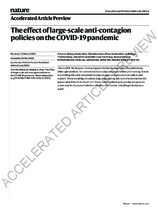Mostrar el registro sencillo del documento
The effect of large-scale anti-contagion policies on the COVID-19 pandemic
| dc.creator | Hsiang, Solomon | |
| dc.creator | Allen, Daniel | |
| dc.creator | Annan-Phan, Sébastien | |
| dc.creator | Bell, Kendon | |
| dc.creator | Bolliger, Ian | |
| dc.creator | Chong, Trinetta | |
| dc.creator | Druckenmiller, Hannah | |
| dc.creator | Huang, Luna Yue | |
| dc.creator | Hultgren, Andrew | |
| dc.creator | Krasovich, Emma | |
| dc.creator | Lau, Peiley | |
| dc.creator | Lee, Jaecheol | |
| dc.creator | Rolf, Esther | |
| dc.creator | Tseng, Jeanette | |
| dc.creator | Wu, Tiffany | |
| dc.date.accessioned | 2020-07-17T23:39:33Z | |
| dc.date.available | 2020-07-17T23:39:33Z | |
| dc.date.created | 2020-06-08 | |
| dc.identifier.issn | 1476-4687 | spa |
| dc.identifier.other | https://www.nature.com/articles/s41586-020-2404-8 | spa |
| dc.identifier.uri | http://hdl.handle.net/20.500.12010/10822 | |
| dc.format.extent | 26 páginas | spa |
| dc.format.mimetype | application/pdf | spa |
| dc.publisher | Science Direct | eng |
| dc.source | reponame:Expeditio Repositorio Institucional UJTL | spa |
| dc.source | instname:Universidad de Bogotá Jorge Tadeo Lozano | spa |
| dc.subject | Políticas anti-contagio | spa |
| dc.title | The effect of large-scale anti-contagion policies on the COVID-19 pandemic | spa |
| dc.type.local | Artículo | spa |
| dc.subject.lemb | Síndrome respiratorio agudo grave | spa |
| dc.subject.lemb | COVID-19 | spa |
| dc.subject.lemb | SARS-CoV-2 | spa |
| dc.subject.lemb | Coronavirus | spa |
| dc.rights.accessrights | info:eu-repo/semantics/openAccess | spa |
| dc.type.hasversion | info:eu-repo/semantics/acceptedVersion | spa |
| dc.subject.keyword | Anti-contagion policies | spa |
| dc.identifier.doi | https://doi.org/10.1038/s41586-020-2404-8 | spa |
| dc.description.abstractenglish | Governments around the world are responding to the novel coronavirus (COVID-19) pandemic1 with unprecedented policies designed to slow the growth rate of infections. Many actions, such as closing schools and restricting populations to their homes, impose large and visible costs on society, but their benefits cannot be directly observed and are currently understood only through process-based simulations2–4. Here, we compile new data on 1,717 local, regional, and national non-pharmaceutical interventions deployed in the ongoing pandemic across localities in China, South Korea, Italy, Iran, France, and the United States (US). We then apply reduced-form econometric methods, commonly used to measure the effect of policies on economic growth5,6, to empirically evaluate the effect that these anti-contagion policies have had on the growth rate of infections. In the absence of policy actions, we estimate that early infections of COVID-19 exhibit exponential growth rates of roughly 38% per day. We find that anti-contagion policies have significantly and substantially slowed this growth. Some policies have different impacts on different populations, but we obtain consistent evidence that the policy packages now deployed are achieving large, beneficial, and measurable health outcomes. We estimate that across these six countries, interventions prevented or delayed on the order of 62 million confirmed cases, corresponding to averting roughly 530 million total infections. These findings may help inform whether or when these policies should be deployed, intensified, or lifted, and they can support decision-making in the other 180+ countries where COVID-19 has been reported7. | spa |

